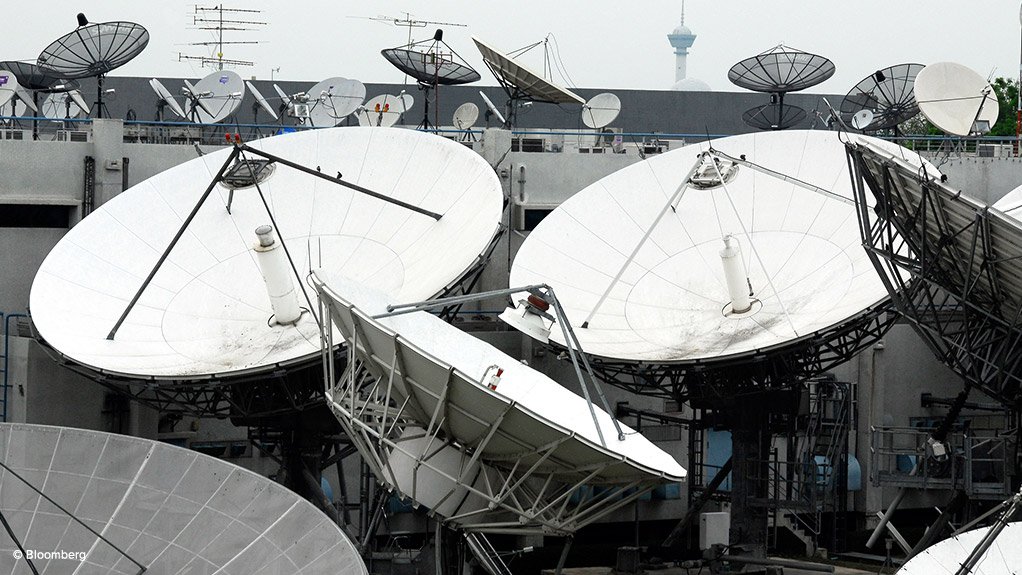Intelsat raises alarm on C-band spectrum split
As regulators mull the international mobile telecommunication (IMT) industry’s call for space on the C-band frequency, commercial satellite services provider Intelsat on Wednesday warned of the dire consequences of reallocating the spectrum.
Intelsat, working with industry stakeholders, was lobbying to hold the exclusivity of the spectrum on the C-band, as the IMT industry moved to claim additional spectrum below 6 GHz, petitioning regulators to identify the band for IMT services.
The C-band spectrum, which was used extensively by satellite operators, comprised 3.4 GHz to 4.2 GHz receive/downlink and 5.8 GHz to 6.7 GHz transmit/uplinks.
As industry awaited a decision at the International Telecommunications Union’s World Radiocommunications Conference in 2015, Intelsat marketing and solutions development senior VP Michael DeMarco told Engineering News Online that many services operated on the C-band would “go dark” should regulators choose to split the spectrum on the band.
Speaking on the sidelines of the AfricaCom conference, held this week, in Cape Town, he explained that the operation of IMT services in the band would “severely” disrupt the important services delivered by satellite and could even prevent future use of this band for satellite services.
An infographic released by Intelsat outlined the “dire consequences” of terrestrial mobile operators’ play on the band, citing examples of the impact on Nigeria, the Democratic Republic of Congo (DRC) and Angola, for which the C-band provided essential communication services.
Currently, Angola, the DRC and Nigeria leveraged more than 1 800 C-band sites for rural connectivity, while 80-million people, or 16-million households, in Nigeria, depended on C-band for access to television content.
Intelsat further pointed out that five-million Angolans in “the most remote places in the world” relied on the 150 C-band very small aperture terminal (vsat) satellite communication systems in play for rural telephony.
C-band also enabled satellite operators to provide critical commercial infrastructure for the oil, gas and mining industries through 1 000 C-band sites across Angola, the DRC and Nigeria.
Intelsat noted that 1 900 C-band vsats in the three countries supported banking services for millions of citizens each day and air navigation services over C-band allowed air travel for 20-million passengers.
The band also enhanced the quality of life for Africa’s citizens through connectivity, education and medical care.
This was seen through the 50 C-band satellites focused over the region that provided critical public services and connectivity for millions of Africans, with 11 500 university students relying on C-band through a Pan-African project.
Further, 300 C-band vsats supported the work of international organisations and nongovernmental organisations in the region. Millions of Nigerians depended on more than 1 200 C-band vsats for health, education and water services, besides others.
Citing examples of potential failures in other regions should the C-band be shared, Intelsat pointed out that 75 000 C-band vsat sites in Indonesia enabled 15-million ATM transactions a day, while 3 000 mobile ATMs relied on C-band antennas for rural banking.
There were 5 050 C-band vsat sites in 375 cities connecting stockbrokers to India’s exchanges and 5 000 additional C-band vsats in use in India for banking networks.
About 1 300 C-band vsat sites also controlled India’s electric grid, while two-thirds of Papua New Guinea’s exports depended on C-band.
In addition, 50% of the audience in India and Indonesia used the band to watch television and, with heavy rainfall in some areas of Papua New Guinea, C-band was essential for broadcasting.
In Indonesia, C-band broadcasting contributed $300-million a year to the economy.
“It [will be] devastating,” DeMarco warned, pointing out that many of the services provided through C-band services cannot be moved to another frequency, meaning they could be taken offline permanently.
Many regulators were not aware of the many vital services provided through satellite services in C-band, he added.
In letters to various regulators, Intelsat pointed out that satellite companies’ heavy reliance on C-band was owing to the number of advantages it had over other frequency bands, such as the Ku- or Ka-bands.
These advantages included the large geographic coverage area of C-band satellite beams that allowed whole regions or continents to be connected – resulting in a cost-effective communications network.
Further, C-band was essentially resistant to rain fade and offered high reliability, even during heavy rain, while the services in higher frequencies occasionally experienced signal degradation.
Comments
Press Office
Announcements
What's On
Subscribe to improve your user experience...
Option 1 (equivalent of R125 a month):
Receive a weekly copy of Creamer Media's Engineering News & Mining Weekly magazine
(print copy for those in South Africa and e-magazine for those outside of South Africa)
Receive daily email newsletters
Access to full search results
Access archive of magazine back copies
Access to Projects in Progress
Access to ONE Research Report of your choice in PDF format
Option 2 (equivalent of R375 a month):
All benefits from Option 1
PLUS
Access to Creamer Media's Research Channel Africa for ALL Research Reports, in PDF format, on various industrial and mining sectors
including Electricity; Water; Energy Transition; Hydrogen; Roads, Rail and Ports; Coal; Gold; Platinum; Battery Metals; etc.
Already a subscriber?
Forgotten your password?
Receive weekly copy of Creamer Media's Engineering News & Mining Weekly magazine (print copy for those in South Africa and e-magazine for those outside of South Africa)
➕
Recieve daily email newsletters
➕
Access to full search results
➕
Access archive of magazine back copies
➕
Access to Projects in Progress
➕
Access to ONE Research Report of your choice in PDF format
RESEARCH CHANNEL AFRICA
R4500 (equivalent of R375 a month)
SUBSCRIBEAll benefits from Option 1
➕
Access to Creamer Media's Research Channel Africa for ALL Research Reports on various industrial and mining sectors, in PDF format, including on:
Electricity
➕
Water
➕
Energy Transition
➕
Hydrogen
➕
Roads, Rail and Ports
➕
Coal
➕
Gold
➕
Platinum
➕
Battery Metals
➕
etc.
Receive all benefits from Option 1 or Option 2 delivered to numerous people at your company
➕
Multiple User names and Passwords for simultaneous log-ins
➕
Intranet integration access to all in your organisation





















